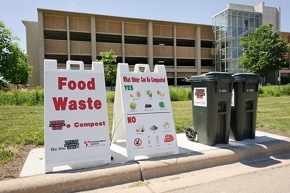New composting option on campus
Commuters to the University of Wisconsin–Madison campus now have a new site to drop off compostable food waste from home or office.
The two new bins are located on the north side of the Lot 76 ramp, accessible via a roundabout near the Goodman Softball Complex.

A new compostable food waste drop off site is pictured just north of the Lot 76 Ramp near the Goodman Softball Complex. The site is part of an ongoing sustainability initiative to increase composting of pre- and post-consumer food waste on campus. An additional food waste collection station is located in Lot 62.
Photo: Jeff Miller
The first drop-off site, on the west end of Lot 62 along Willow Creek, was set up as a pilot project in November 2011. News spread quickly by word of mouth and the site has become even more popular than expected.
“We just tried it out to see how it would work. Over the months, even without any marketing, usage has increased so we expanded from two bins to four to accommodate the volume we were getting,” says Frank Kooistra, the coordinator for operations in the UW–Madison Office of Sustainability.
The project is a partnership between the Office of Sustainability, the We Conserve program, Transportation Services, Physical Plant, and the College of Agricultural and Life Sciences.
The bins are emptied twice each week, on Mondays and Thursdays, and the waste is combined with pre-consumer waste from the campus unions, housing, and UW Hospital and taken to the West Madison Agricultural Research Station for composting.
The majority of the resulting compost is used for research programs at the agricultural research station. The rest is sold to bulk buyers and the funds used to support the equipment needed to collect and process the waste.
“All this compost goes to support the university’s research programs,” Kooistra says.
Compostable items include fruit and vegetable peelings and cores, stale bread, coffee grounds and filters, tea bags, egg shells, pasta and rice, paper towels and napkins, and shredded newspaper. Plastic and items containing meat, fish, bones, or dairy products should not be included. A complete list is available here.
Kooistra collects his compostable items in a brown paper bag and places the whole bag into the collection bin. (Plastic bags are not compostable and should not be placed in the bin.) “Especially for people who don’t want to go to the trouble of composting at home or who don’t have a garden, we wanted to provide an alternative to sending the waste to a landfill,” he says.
In the future they hope to expand the composting program to east campus, Kooistra says, but haven’t yet found a suitable location.
Tags: environment, sustainability
